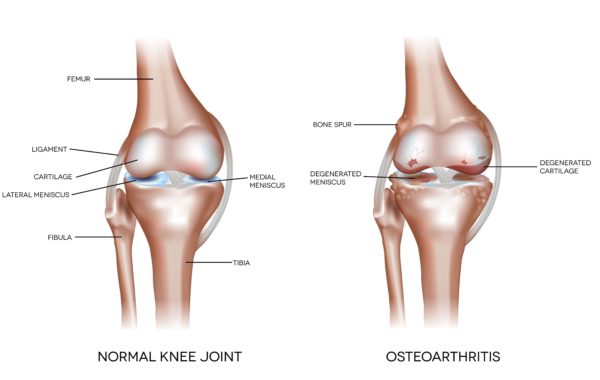What is osteoarthritis of the knee?
Osteoarthritis of the knee is a painful condition, mostly affecting people in their 50’s onwards, and is routinely associated with stiffness, joint swelling and crepitus (a sensation of grinding which can be audible in some cases). Osteoarthritis of the knee occurs when the articular cartilage, a special tissue that covers the end of the bones providing shock absorption and smooth joint movement, is placed under prolonged periods of stress. The articular cartilage can become irritated after injury, repetitive uncontrolled twisting or turning motions of the knee, or because of weakness of the muscles surrounding the hip, knee, and foot. Over time inappropriate and/or excessive stresses placed on the articular cartilage can cause it to thin, and eventually wear away. This results in the underlying bone surfaces of the knee joint (previously protected by the articular cartilage) coming into direct contact. Furthermore, due to this process the inner lining of the joint capsule (known as the synovial membrane) can become irritated and inflamed. An inflamed synovial membrane is called synovitis. Synovitis is responsible for the significant flares in pain experienced by many patients suffering from osteoarthritis of the knee.

Over the Covid-19 pandemic, Complete injections has seen a vast increase in the numbers of people attending clinic for the treatment of osteoarthritis of the knee. Many reasons have led to this increase. With the ongoing strain placed on NHS musculoskeletal services, patients are struggling to receive timely treatment. Delays in treatment has resulted in patients suffering from a worsening of progressive, long-term conditions such as osteoarthritis of the knee.
Furthermore, as the restrictions on leisure centres and sports clubs have started to ease many people have been able to return to much loved activities. Many patients have reported that returning to exercise or sport caused a flare up of their osteoarthritis. After prolonged periods of inactivity, the thought of returning to an exercise class or sport can be very exciting. However, care must be taken to ensure the body is fit and strong enough to withstand the challenges, especially in the face of osteoarthritis. This is particularly true to sports that require twisting and turning movements such as golf and tennis.
These factors have led many people to seek private treatment.
What is hyaluronic acid?
Hyaluronic acid is a naturally occurring substance found within many connective tissue types including joints. It is produced by the articular cartilage and the synovial membrane of the joint and is responsible for shock absorption and lubrication, allowing the joint to move freely (Sirin et al., 2018). Research has shown that to be an effective joint lubricant hyaluronic acid needs to be thick and viscous (sticky). However, in the presence of osteoarthritis of the knee, naturally occurring hyaluronic acid can become thinner and lose its viscosity.
Naturally occurring hyaluronic acid can be supplemented in patients with osteoarthritis via injection. Research has shown that injecting a synthetically produced version of hyaluronic acid into a knee joint can reduce pain and increase functional ability and quality of life, as well as postpone total knee replacement (Altman et al., 2015; Baron et al., 2018; Maheu et al., 2019; Gigis et al., 2016; Bahrami et al., 2020; Wu et al., 2021; Vannabouthong at el., 2018; Hwang et al., 2020; Trellu et al., 2015; Koh et al., 2019).
Hyaluronic acid supplementation has been shown to work in a multitude of ways (Altman et al., 2015). These are as follows:
- Healthy articular cartilage is promoted by inhibiting the death of chondrocytes (articular cartilage cells) and promoting the development of new chondrocytes.
- Key proteins found in the articular cartilage are stimulated.
- Hyaluronic acid produces anti-inflammatory mediators which helped to reduce pain and inflammation associated with synovitis.
- The viscosity of hyaluronic acid (known as viscoelasticity) increases joint lubrication and shock absorption.
- Subchondral bone (the layer of bone found underneath the articular cartilage which becomes exposed during the process of osteoarthritis) density is increased.

Patients often ask the following questions about hyaluronic acid injections:
“How do I know if a hyaluronic acid injection is right for me?”
The answer is to this is multifactorial and requires answering the following questions:
- Do you have a diagnosis (either via x-ray or MRI) of mild to moderate osteoarthritis of the knee?
- Are you fit and active and want to remain so?
- Is your knee painful and limiting your ability to complete activities of daily living, sleep, or exercise?
- Have you previously had steroid injections and do not wish to have more?
- Do you want to postpone possible future knee replacement?
- Are you under 60 years old? (The best results have been noted in patients under 60.)
“How is a hyaluronic acid injection administered?”
All injections undertaken at Complete are undertaken using ultrasound guidance and are accompanied by local anaesthetic. An ultrasound guided injection uses an ultrasound machine to assist positioning the needle in the knee joint. Ultrasound guided injections have been shown to be highly accurate at delivering a dose of medication directly into the knee (98-100% accuracy compared to 55% accuracy when compared to landmarked guided injections (Daniels et al., 2018).
“How quickly does a hyaluronic acid injection work and is it possible to combine hyaluronic acid with a corticosteroid?”
Hyaluronic acid injections do not work overnight. Current research shows that it can take anywhere between two to five weeks for hyaluronic acid to take effect (Gigis et al., 2016; Bowman et al., 2018). Due to the prolonged period of activation, hyaluronic acid injections can either be combined with a corticosteroid for patients who require additional rapid pain relief (corticosteroid is a fast-acting anti-inflammatory) or used prophylactically for patients who are not in acute pain.
How often can I have a hyaluronic acid injection?”
Hyaluronic acid injections are very safe and can be repeated as and when you feel symptoms are returning. Hyaluronic acid injections have been shown to provide effective symptom relief for over six months and can be repeated at regular intervals without any deleterious effects.
“Is there anything I can do after the injection to maximise outcomes?”
To ensure you get the most out of a hyaluronic acid injection and address the underlying causes of your pain it is advisable to start a physiotherapy programme within two weeks after the injection. Making sure your knee is strong and flexible is of paramount importance to protect the knee (Hunter et al., 2009).
What do our patients say about hyaluronic acid injections for osteoarthritis of the knee?
Edward, a 50-year-old builder who plays Sunday league football had been experiencing right-sided knee pain after waking up one morning. His GP organised an x-ray which showed early-stage osteoarthritis of the knee. Edwards knee pain was stopping him from playing football and affecting his work as a builder. He was keen to continue working and playing football and had been diligent with his physiotherapy rehab for 3 months, but he was still having pain. This is what Edward had to say:
“I don’t like putting unnecessary medicine in my body, so I avoided having a steroid injection for months. I was looking for an alternative to help settle my knee pain when I stumbled across hyaluronic acid. Complete injections has a very well presented website with lots of information about hyaluronic acid, so I gave them a call. I found the whole process very easy. From making the appointment to seeing Luke at the Cambridge clinic was seamless. Luke did an ultrasound scan of my knee which showed some wear and tear and a small swelling. We discussed the pros and cons of hyaluronic acid and I decided to give it a go. Luke was very thorough in explaining the procedure and what to expect. He said it may take up to 5 weeks to fully work. Mine started working within 3 weeks. I have been able to play football again and do not have pain during work. I will definitely go back for a booster injection when I feel my knee starts to trouble me again. If you are looking for an alternative to steroid injections and want to stay active, then look no further. Try hyaluronic acid, it worked well for me!”
Hyaluronic acid injections are a safe and effective alternative to corticosteroid injections for the treatment of osteoarthritis of the knee. For more information about hyaluronic acid injections or to book a consultation, please call 020 7482 3875 or email info@complete-physio.co.uk
References
- Altman, R.D., Manjoo, A., Fierlinger, A., Niazi, F. & Nicholls, M. 2015, “The mechanism of action for hyaluronic acid treatment in the osteoarthritic knee: a systematic review”, BMC musculoskeletal disorders, vol. 16, no. 1, pp. 321.
- Bahrami, M.H., Raeissadat, S.A., Cheraghi, M., Rahimi-Dehgolan, S. & Ebrahimpour, A. 2020, “Efficacy of single high-molecular-weight versus triple low-molecular-weight hyaluronic acid intra-articular injection among knee osteoarthritis patients”, BMC musculoskeletal disorders, vol. 21, no. 1, pp. 550.
- Baron, D., Flin, C., Porterie, J., Despaux, J. & Vincent, P. 2018, “Hyaluronic Acid Single Intra-Articular Injection in Knee Osteoarthritis: A Multicenter Open Prospective Study (ART-ONE 75) with Placebo Post Hoc Comparison”, Current therapeutic research, vol. 88, pp. 35-46.
- Daniels, E.W., Cole, D., Jacobs, B. & Phillips, S.F. 2018, Existing Evidence on Ultrasound-Guided Injections in Sports Medicine, SAGE Publications, Los Angeles, CA.
- Gigis, I., Fotiadis, E., Nenopoulos, A., Tsitas, K. and Hatzokos, I., 2016. Comparison of two different molecular weight intra-articular injections of hyaluronic acid for the treatment of knee osteoarthritis. Hippokratia, 20(1), p.26.
- Hunter, D.J. & Bierma-Zeinstra, S. 2019, “Osteoarthritis”, The Lancet, vol. 393, no. 10182, pp. 1745-1759.
- Hwang et al., 2020. Intra-articular Injections of Hyaluronic Acid on Osteochondral Lesions of the Talus After Failed Arthroscopic Bone Marrow Stimulation d, .
- Koh, S.H., Lee, S.C., Lee, W.Y., Kim, J. & Park, Y. 2019, “Ultrasound-guided intra-articular injection of hyaluronic acid and ketorolac for osteoarthritis of the carpometacarpal joint of the thumb”, Medicine, vol. 98, no. 19.
- Maheu, E., Bannuru, R.R., Herrero-Beaumont, G., Allali, F., Bard, H. & Migliore, A. 2019, “Why we should definitely include intra-articular hyaluronic acid as a therapeutic option in the management of knee osteoarthritis: Results of an extensive critical literature review”, Seminars in arthritis and rheumatism, vol. 48, no. 4, pp. 563-572.
- Sirin, D.Y., Kaplan, N., Yilmaz, I., Karaarslan, N., Ozbek, H., Akyuva, Y., Kaya, Y.E., Oznam, K., Akkaya, N., Guler, O., Akkaya, S. & Mahirogullari, M. 2018, “The association between different molecular weights of hyaluronic acid and CHAD, HIF-1α, COL2A1 expression in chondrocyte cultures”, Experimental and therapeutic medicine, vol. 15, no. 5, pp. 4205-4212.
- Trellu, S., Dadoun, S., Berenbaum, F., Fautrel, B. & Gossec, L. 2015, “Intra-articular injections in thumb osteoarthritis: A systematic review and meta-analysis of randomized controlled trials”, Joint, bone, spine : revue du rhumatisme, vol. 82, no. 5, pp. 315-319.
- Vannabouthong at el., 2018. Intra-articular Injections in the Treatment of Symptoms from Ankle Arthritis c, .
- Wu et al., 2021. Molecular Weight of Hyaluronic Acid Has Major Influence on Its Efficacy and Safety for Viscosupplementation in Hip Osteoarthritis A Systematic Review and Meta-Analysis e, .

